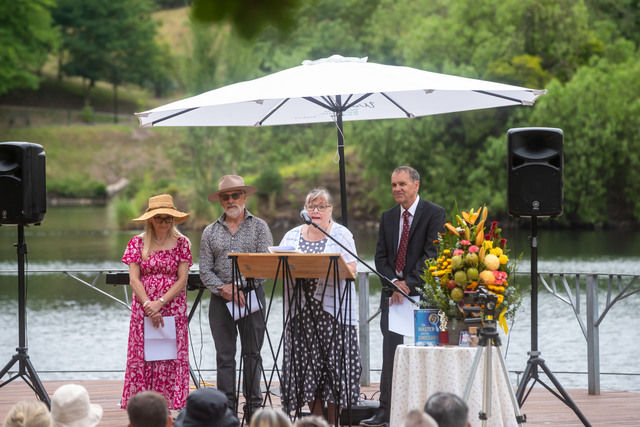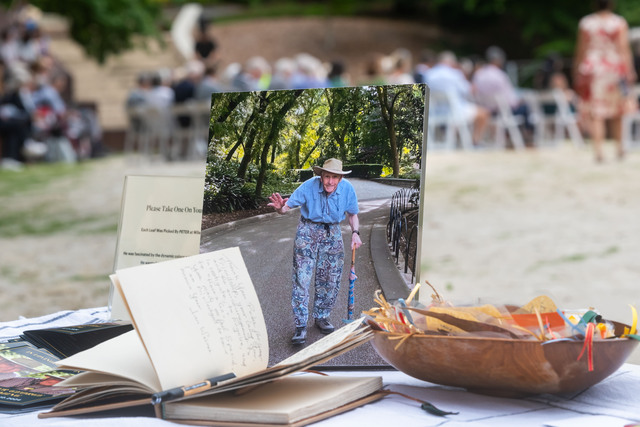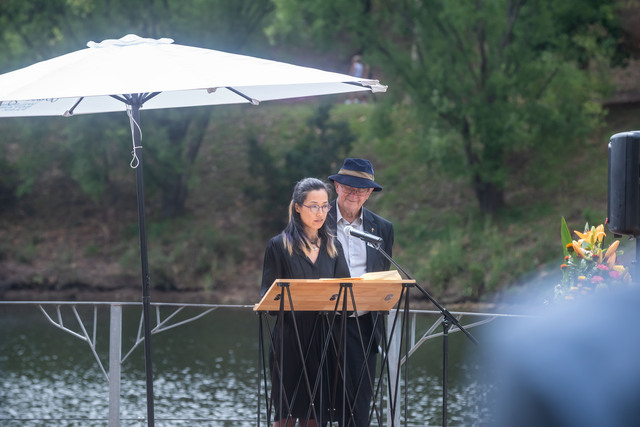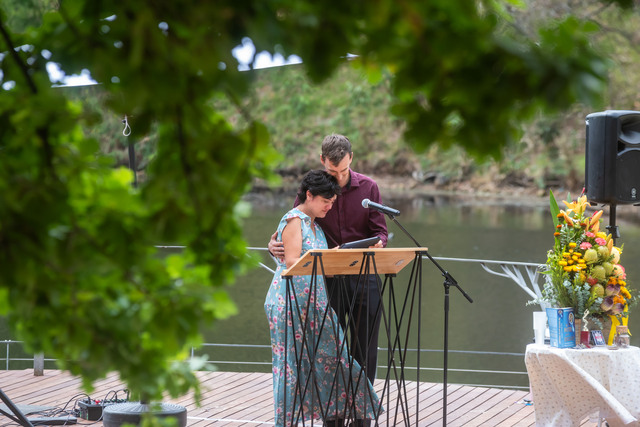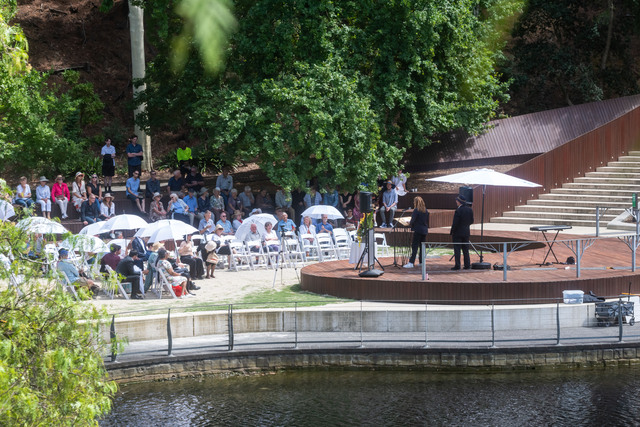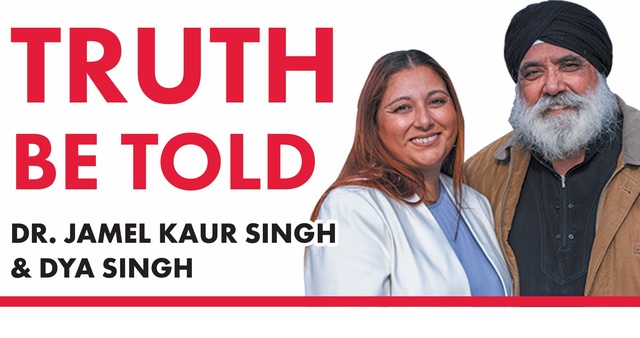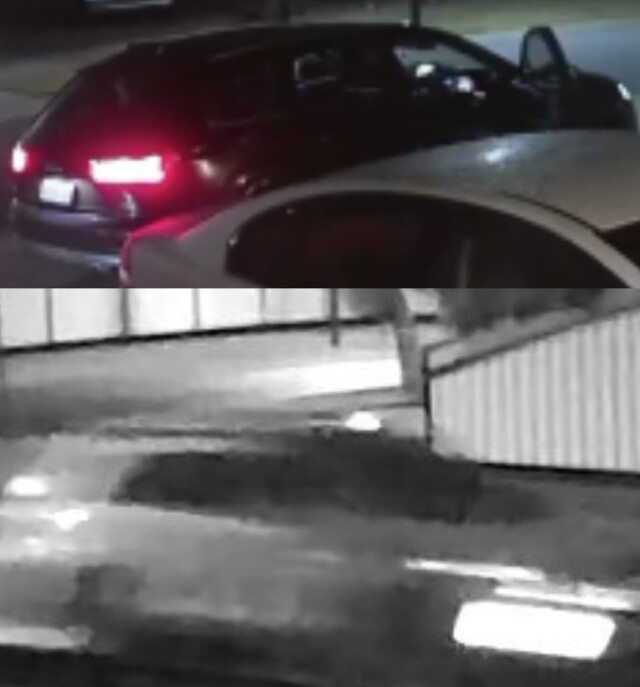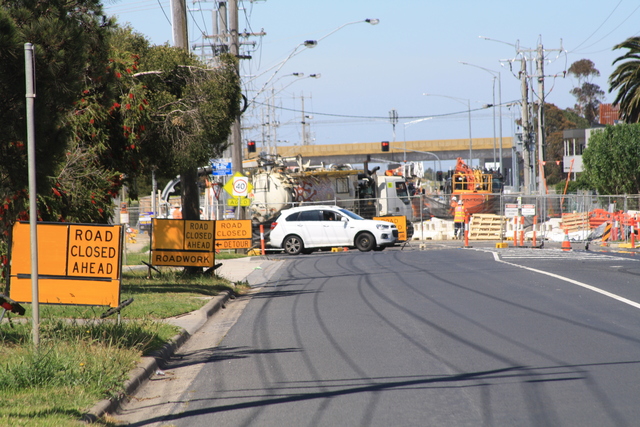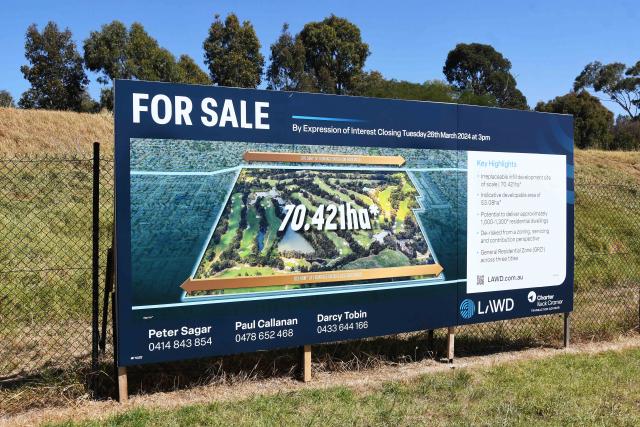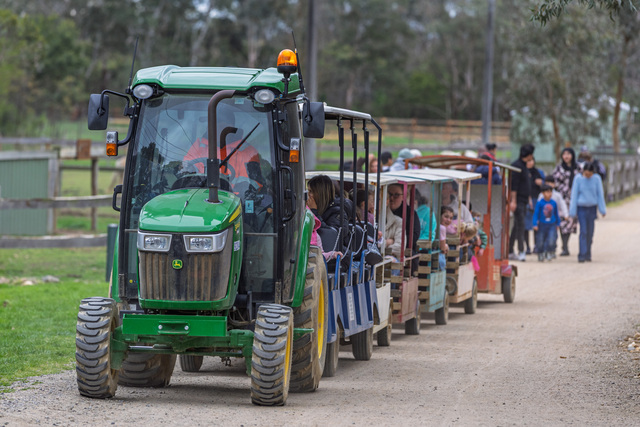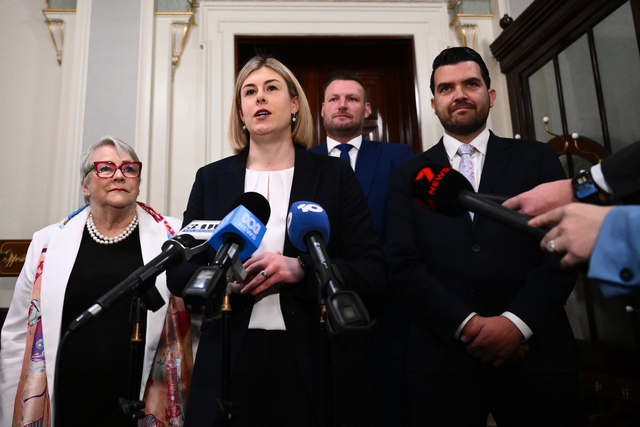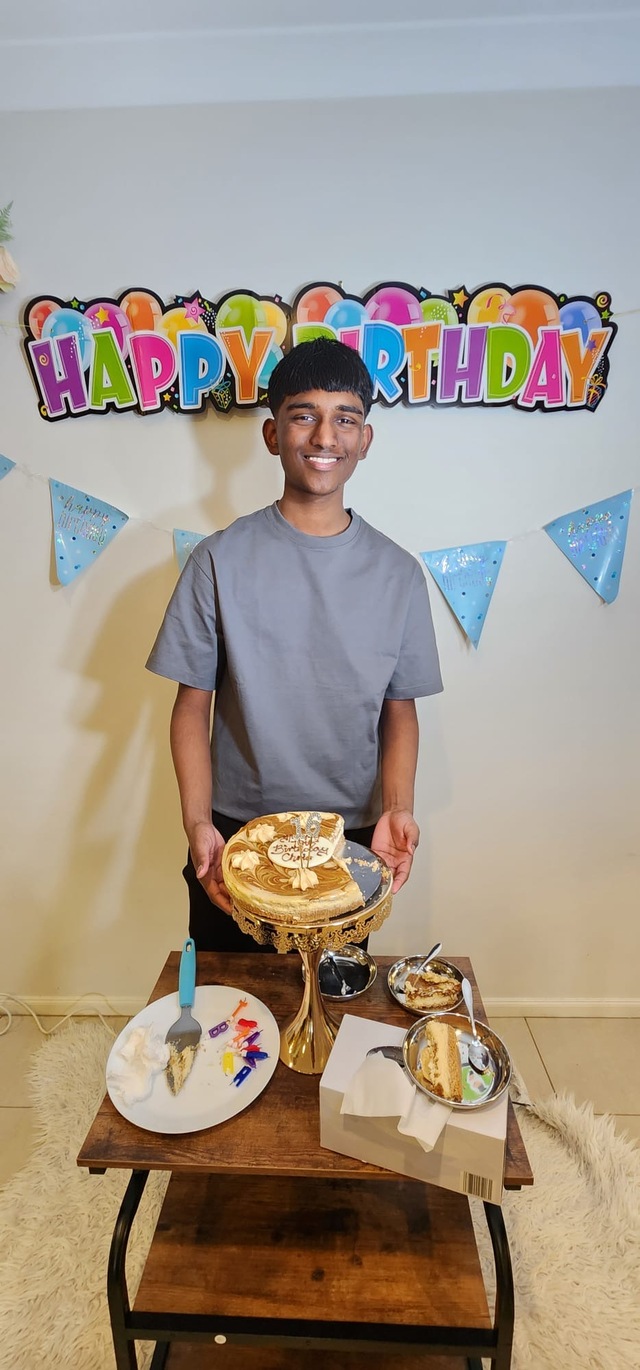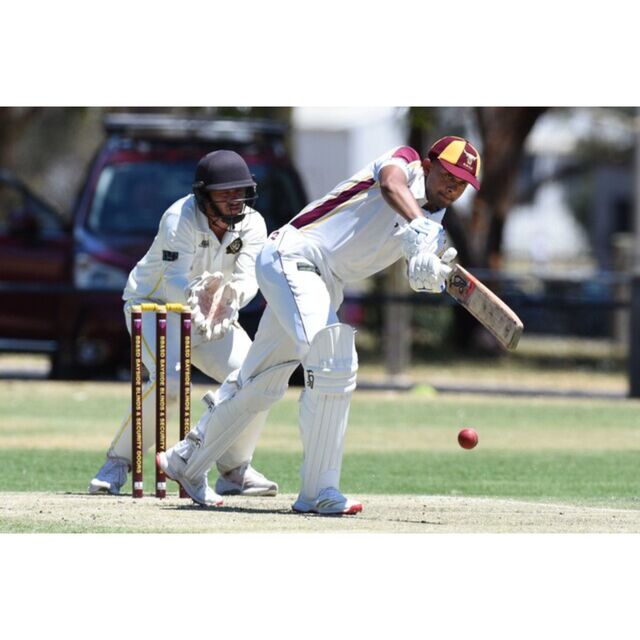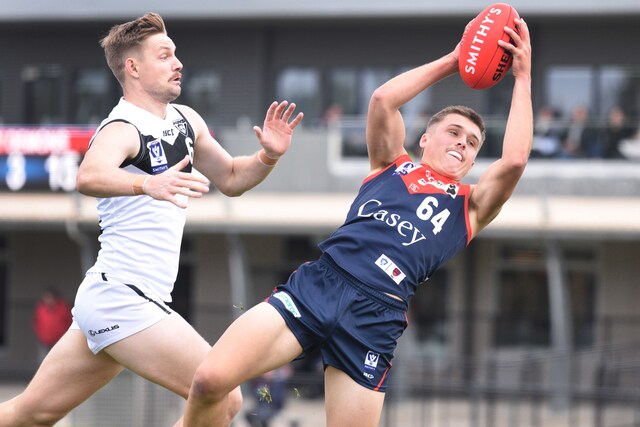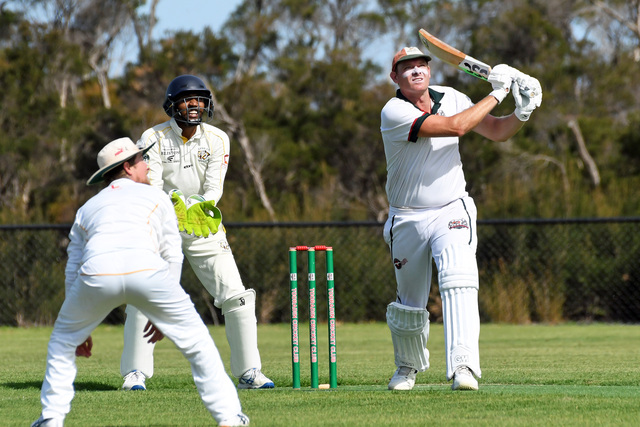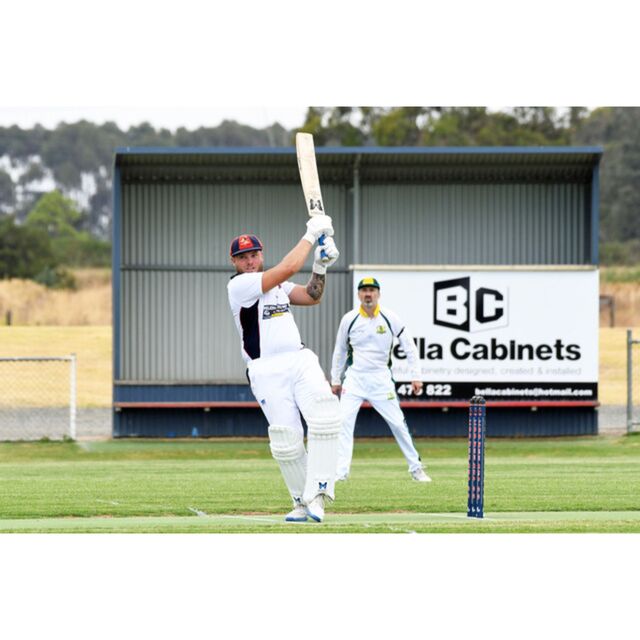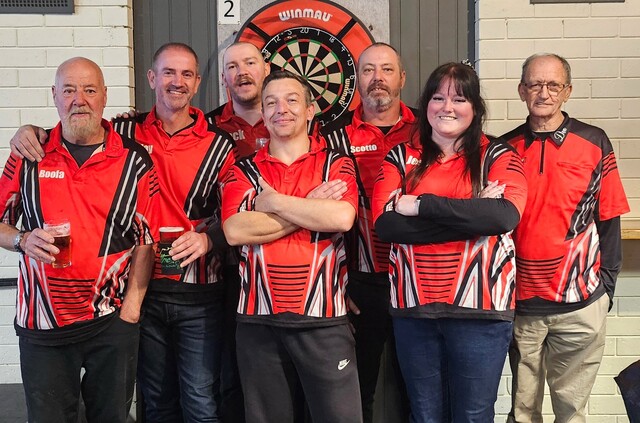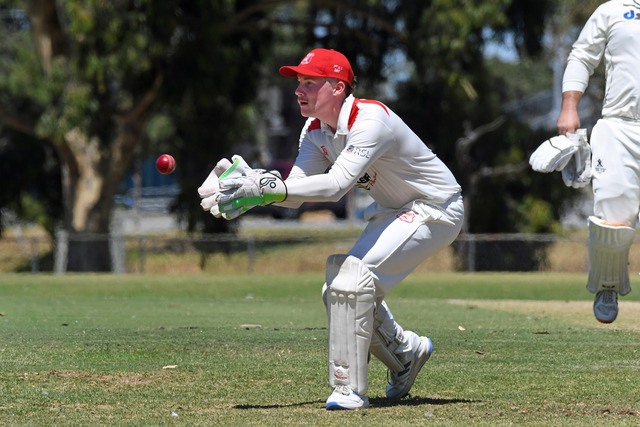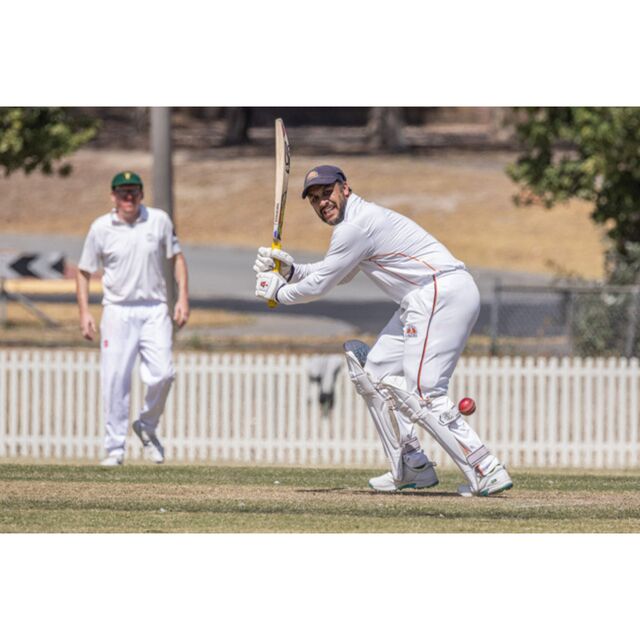On the cool yet sunny morning on Tuesday 14 January, family, friends and many others who have been touched by Peter Fleming’s actions gathered at the western lakeside open space at Wilson Botanic Gardens in memorial of his life and his contributions.
Following the Parkrun event just the Saturday before, where over a hundred people took part in running a new route to commemorate Peter George Fleming’s impact on the group, the Tuesday morning memorial saw that same love in the air.
With the stage set at 10am, and the large trees providing ample shade, Reverend Tony Duncan began the service not by reciting a sermon but by singing ‘Make Me A Channel Of Your Peace’ instead alongside two of Peter’s grandchildren.
Love was a big part of Peter’s character, with son, Mark Fleming recounting that his father “was never threatened by other people’s achievements but rather experienced happiness in other people’s success”.
“His desire was to always encourage and empower people, to make others’ lives better and he lived for other people – he didn’t live for himself.”
Peter, born on 10 October 1932, was a person who found his connection with the outdoors, having spent time at his grandparents’ home in Parkdale and recalling fond memories of visits to the beach and their holiday home in Healesville.
Visits to his uncle’s farm in Mallee were frequent, and, according to Mark, after being subject to bullying, he became fond of exercise and sports such as swimming, rowing, athletics, boxing, gymnastics and football.
While he had struggled academically, it wasn’t until he found science that he found his footing, with son Robert Fleming saying that his father felt, in his later years, “that people who experienced failure themselves usually made better teachers”.
“Maybe that was why he wasn’t afraid to have a go and risked making mistakes,” he said.
It was Peter’s time at Geelong College from 1944 to 1949 when he joined the Exploration Society, where his love for nature grew exponentially.
He enjoyed bushwalks and hikes and by the age of 16, he became a member of Base Camp in the first successful attempt to climb Federation Peak in Tasmania; he also joined an expedition to explore the caves on the Nullarbor Plain for a month, and he became a volunteer search and rescue team member in the 1960s.
Before that, he was admitted to Melbourne University in 1950 under a science and teaching studentship; however, it was also the fated place where he met his future wife, Wenda Cordingley on his first day.
“His first day at university was memorable because he spotted a particularly lovely female fellow first-year student, he took note of her name and engineered an introductory conversation with her by the end of the day,” Robert said.
“Our father always described meeting our mother and calling her, then marrying her five years later as being the best life choice that he ever made.”
The outdoor escapades continued, now with Wenda along for the ride, the couple joined the Mountaineering Club; being devout Christians, they also joined the university’s Christian movement, and alongside Wenda’s family, attended the Avenue Presbyterian Church in Blackburn where he served as an elder and a youth group leader.
Fast forward a few decades in his later years, Jessica Zhao became his carer in 2019, an experience she coined as six years of feeling part of the family.
“Peter kept himself busy with promoting community well-being, it gave him meaning and made him feel good, and I’m sure many of you have come to know him through that,” she said.
“Through U3A, Peter was a champion for his running classes, he facilitated and participated in up to five classes regularly, and he always set up the house for the class in the morning.”
Speaking on his character, Jessica lamented that Peter, no matter the avenue, may it be through educational discussions or sport, “did not make enemies despite winning more often than losing”.
Encouragement was key and support towards others was key, where he was adamant that people “exist in their own unique ways” and that he was interested in “what makes a human, human, not what makes me different from you”.
Outside of his love for nature, Peter spent time learning about current affairs and was a regular donor to over 40 organisations for their development and charity work – ranging from humanitarian work and research to social justice, environmentalism, education and health.
“Regarding his relationship with individuals, many of you here would agree that Peter has a special way of connecting with others, he embraced diversity and wanted to help people engage in life,” Jessica said.
It was in 1955 when Peter was awarded the Bachelor of Science and a Diploma of Education, soon after finding himself teaching maths and science at Box Hill High School.
His teaching saw him travel to a number of different schools, from Mac Rob Girls’ High School to Nunawading High School until 1960, then Greythorn High School from 1961 to 1964.
From that point, both Peter and Wenda found a calling for overseas service, where on 5 January 1965, they departed with Anne, Robert and Mark for two years in East Africa.
“Our parents taught at a boarding school located around 30 kilometres southwest of Dar es Salaam and it was attended by over 600 male students from across Kenya and Tanzania,” Robert said.
“We lived on campus in a concrete house, it was very simple and a very simple way of life – chimpanzees constantly chattered at us while hanging in the jungle, occasionally lions growled at night, various lizards, snakes and armies of ants kept us occupied.
“For us kids, it was a carefree existence with a great deal of education, there were adventures and every term break we went on safari tours in our Citroen.”
It was also here where Peter scaled Kilimanjaro just after the birth of Sally in December 1965.
Soon after, the family returned to Melbourne, but of course, detours were a must and stops at New Delhi, Kathmandu, Calcutta, Bangkok and Singapore were made.
While returning to Melbourne saw the family make more adjustments to their lifestyle, they also found that they yearned for the outdoors more than ever.
This period of Peter’s life saw him endeavour in multiple avenues of work and roles, where in 1968 he was appointed as the Head of Department at Melbourne Secondary Teacher’s College.
In the 1970s, he was appointed as the Coordinator of Studies for Dip Ed at Melbourne State College, and just before the decade passed in 1979, he was awarded the Doctor of Philosophy with his thesis on the Interaction of Personality with Tertiary Teaching/Learning Method.
A year later in 1980, he was part of the first staff exchange between the University of Melbourne and the University of Oregon for seven months, with Wenda and Sally accompanying him.
From 1981 to 1994, he was appointed as the Director of Educational Development in the Family Medicine Programme (FMP) with the Royal Australian College of General Practitioners (RACGP), which in 1993, he was awarded an Honorary Membership for.
Before all this, with the family’s return to Australia, it was evident that what would soon be a massive undertaking of learning from Peter would also be seen in his children.
“Robert Mark and I would go on extensive cycling expeditions,” Sally said.
“The family was also all actively involved in the life of St Stephen’s Presbyterian Church, and our father and mother were a closely knit team.
“Both of them were environmentalists and conservationists, and from an early age, we were taught about the importance of appreciating and taking care of the environment and so on.
“We often went bushwalking on weekends, and in more recent times, Peter and Wenda decided to convert the swimming pool in their Berwick home into a natural pond.”
After Peter retired in 1994, both he and Wenda went on a number of overseas trips before they settled in their final home in Berwick in 2006.
Once that project was finished, Peter took to the track and in his late thirties, running became the norm until his late eighties when his meniscus began to wear thin.
Then in 2013, Wenda passed, and it became a regular occurrence to see Peter taking on the Wilson Botanic Garden’s paths, greeting the Saturday runners as they went on their laps.
“This didn’t stop him from ploughing onwards around the park, especially when he walked in the opposite direction to the participants to encourage them along the way,” Sally said.
According to his daughter Anne, Peter found himself needing to be occupied, and it was then that he became heavily involved with Casey’s U3A, and was called to RMIT University to receive the Best Victorian U3A Class award in October 2024.
“If we hadn’t realised prior, it became apparent to the family that our father didn’t do anything by halves and that he was an all-or-nothing kind of man,” Anne said.
“It became a joke amongst the children that we needed to book an appointment to see him, and invitations to family events were sometimes declined by Peter due to his other commitments.
“Whether it was in his role as a secondary teacher, university lecturer, a trainer of the trainers of medical graduates, or involvement in U3A, Peter was always looking for ways to improve the experience of learning.”
In the present, much of Peter’s influence could be observed in his children and also in the wider family, with Laura Young, who spoke on behalf of all the cousins saying that Peter was a teacher not just in the “formal sense, but in the quiet everyday moments that shaped our lives”.
“He wasn’t the kind of person to stand at the front of the room giving lectures, he taught through actions by sharing what he loved and by showing us how to embrace the world around us,” she said.
A number of community tributes were also made, with one from David Hooke, and representatives from Casey U3A, Parkrun Australia and Wilson Botanic Park.
For the family, friends and the wider community, Peter is a man who will be sorely missed.
“In his quiet way, grandpa taught us to see the world with wonder and appreciation and to notice the small things that a lot of us will probably overlook,” Laura and the cousins said.
“As we reflect on all these memories we realise that grandpa wasn’t just someone who passed through our lives, but someone who encouraged us to be curious and to always keep learning and to never take life too seriously.”

